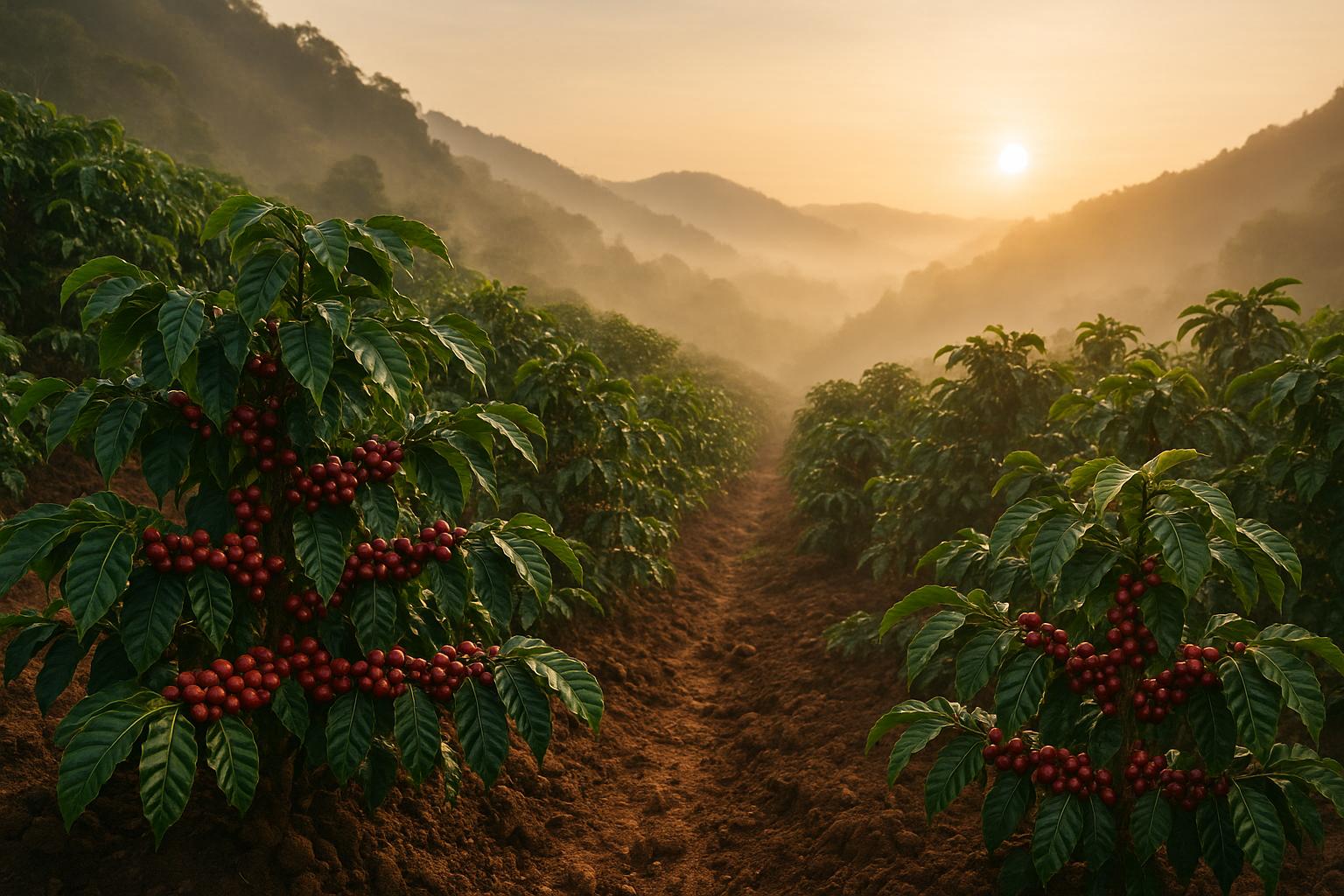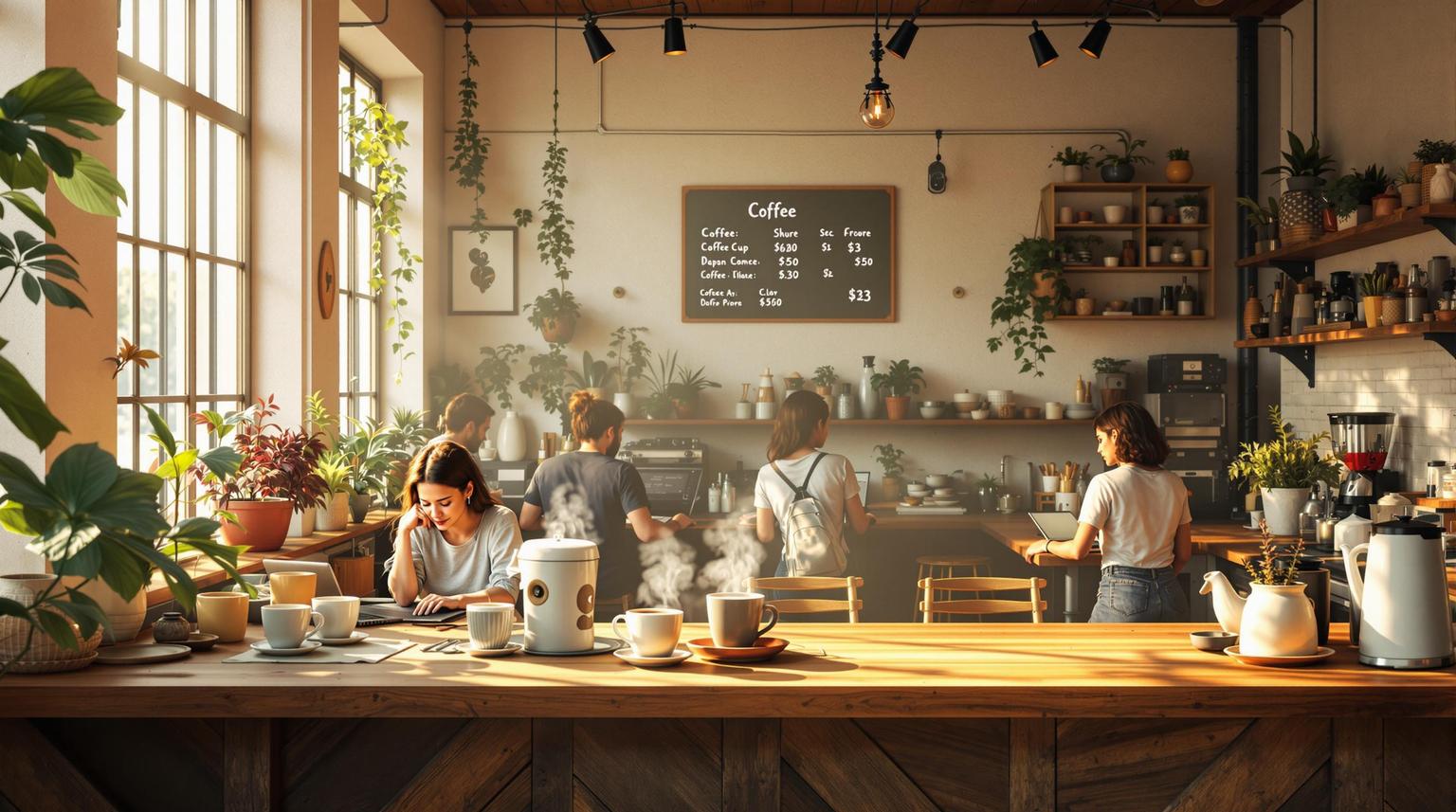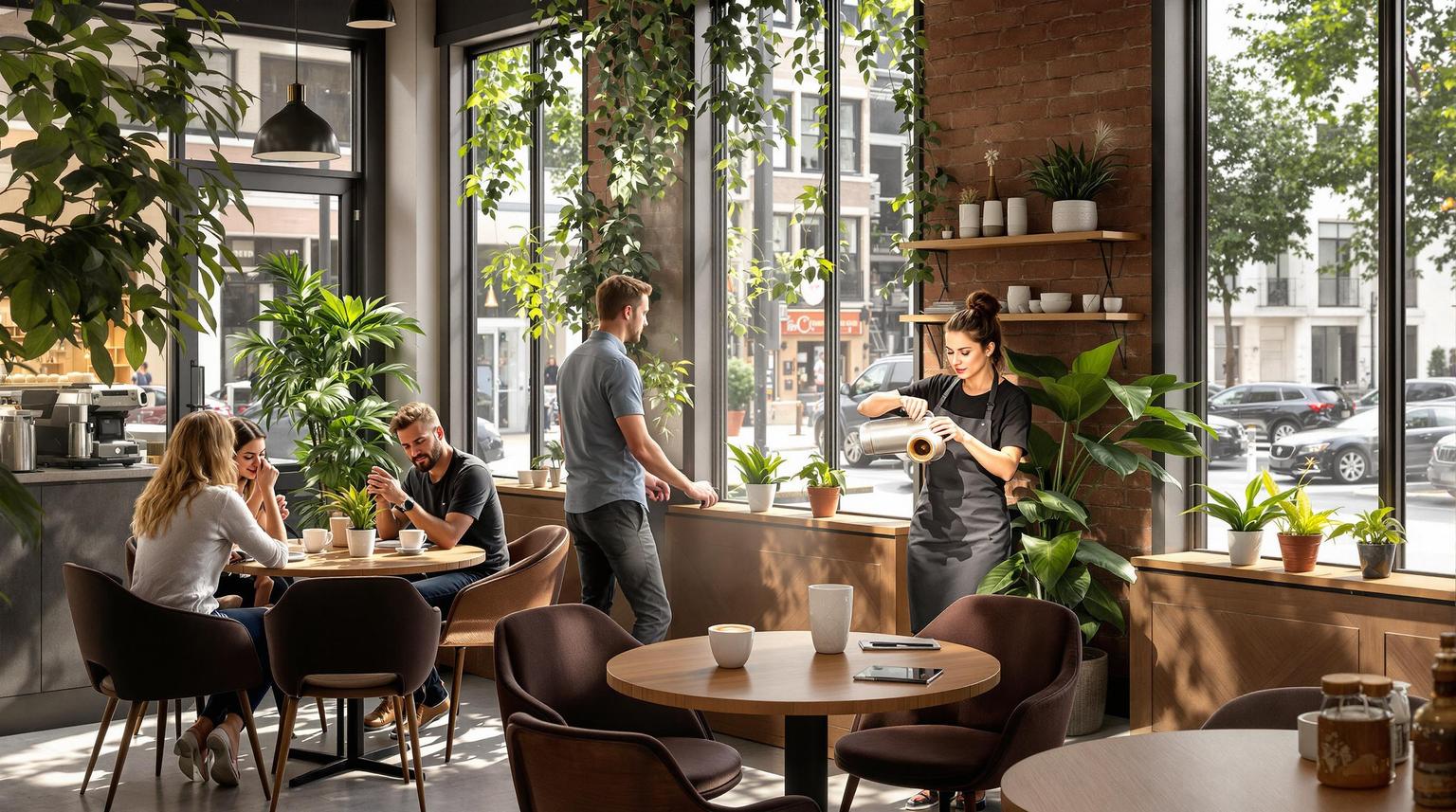Chicago's coffee scene is thriving with roasters focused on ethical practices like fair sourcing, eco-friendly methods, and community support. Here's what sets ethical roasters apart:
- Fair Sourcing: Many build direct relationships with farmers or use fair trade certifications to ensure fair compensation and traceability.
- Sustainability: Practices include energy-efficient roasting, composting waste, and using recyclable or compostable packaging.
- Community Focus: Contributions include workshops, collaborations with local businesses, and charitable donations.
Top ethical roasters in Chicago include Sparrow Coffee, Groundswell Coffee Roasters, and Modest Coffee. They prioritize fair sourcing, reduced emissions, and local engagement, proving great coffee can align with responsible practices.
For a full guide to ethical coffee spots, visit BestCafeChicago.org.
Building community through coffee | This North Lawndale coffee shop has turned into a destination
What Makes a Coffee Roaster Ethical?
Ethical coffee roasters stand out by prioritizing transparency, fair treatment of farmers, and reducing their environmental footprint. These principles guide their every decision, from sourcing beans to choosing packaging materials.
By ensuring farmers are paid fairly, adopting sustainable practices, and actively engaging with their communities, these roasters balance profit with a commitment to people and the planet. Let’s take a closer look at how these values shape their sourcing methods, operational decisions, and community involvement.
Fair Sourcing Methods
Sourcing coffee ethically is the cornerstone of an ethical roaster’s mission. These roasters focus on transparent supply chains and foster direct relationships with coffee farmers. Instead of relying on commodity markets, where farmers often receive inadequate compensation, they establish direct trade agreements that guarantee fair pricing and stable, long-term partnerships.
Through direct trade relationships, roasters collaborate closely with individual farms and cooperatives. This approach often includes paying premiums above fair trade minimums, providing financial stability for farming communities. It also allows roasters to trace their beans from farm to roastery, ensuring quality and accountability. For instance, many roasters in Chicago regularly visit partner farms to strengthen these connections.
While direct trade offers flexibility, fair trade certification remains a popular option for guaranteeing fair compensation. This certification sets minimum price thresholds, enforces environmental guidelines, and prohibits child labor. Some roasters value the structure and third-party verification fair trade provides, while others prefer the adaptability of direct trade.
The most ethical roasters prioritize transparency, sharing detailed information about their sourcing practices - like the names of farmers, farm locations, and prices paid. This openness empowers consumers to make informed choices and holds roasters accountable for their ethical claims.
Green Business Practices
Sustainability is woven into every aspect of an ethical roaster’s operations. For starters, they often use energy-efficient roasting equipment, which helps reduce their carbon footprint. Many modern roasters incorporate afterburners to lower smoke emissions and heat recovery systems to conserve energy during the roasting process.
Reducing waste is another key focus. Ethical roasters frequently compost chaff (the thin skin shed from coffee beans during roasting) or donate it to local gardens as organic material. Some even go a step further by eliminating single-use packaging, offering bulk beans or encouraging customers to bring reusable containers.
When it comes to packaging, sustainable options are a must. Many roasters opt for compostable bags made from plant-based materials, recyclable aluminum containers, or reusable glass jars. While these materials can be more expensive, they reflect a commitment to environmental responsibility.
To further offset their impact, some roasters participate in carbon offset programs or invest in renewable energy. This might involve purchasing offsets to achieve carbon neutrality or installing solar panels to power their facilities.
Community Support
Ethical roasters recognize the importance of thriving local communities and actively contribute to their growth. Educational initiatives are a big part of this effort, with many offering cupping classes, brewing workshops, and other programs to help consumers understand the nuances of specialty coffee and the challenges of coffee production.
Through local partnerships, roasters collaborate with nearby bakeries, restaurants, and cafés, supplying freshly roasted beans while supporting other small businesses. These relationships reinforce a shared commitment to quality and community values.
Charitable giving is another way ethical roasters make a difference. Many donate a portion of their profits to causes like coffee farming communities, environmental conservation, or local social services. Some even establish their own foundations or work with nonprofits to maximize their impact.
Lastly, ethical roasters demonstrate their values through employee welfare. By offering fair wages, health insurance, paid time off, and opportunities for professional growth, they ensure their teams are supported and valued. This not only benefits employees but also strengthens the overall coffee industry.
In addition to these efforts, ethical roasters educate consumers about the challenges facing coffee producers and the importance of sustainable practices, fostering a deeper appreciation for the coffee they enjoy every day.
Top Ethical Coffee Roasters in Chicago
Chicago's coffee scene is a vibrant mix of exceptional flavors and a strong commitment to fair sourcing, eco-friendly practices, and community support. Several roasters stand out for their dedication to ethical standards and sustainability while delivering outstanding coffee. Here's a closer look at three of the city's top ethical coffee roasters.
Sparrow Coffee
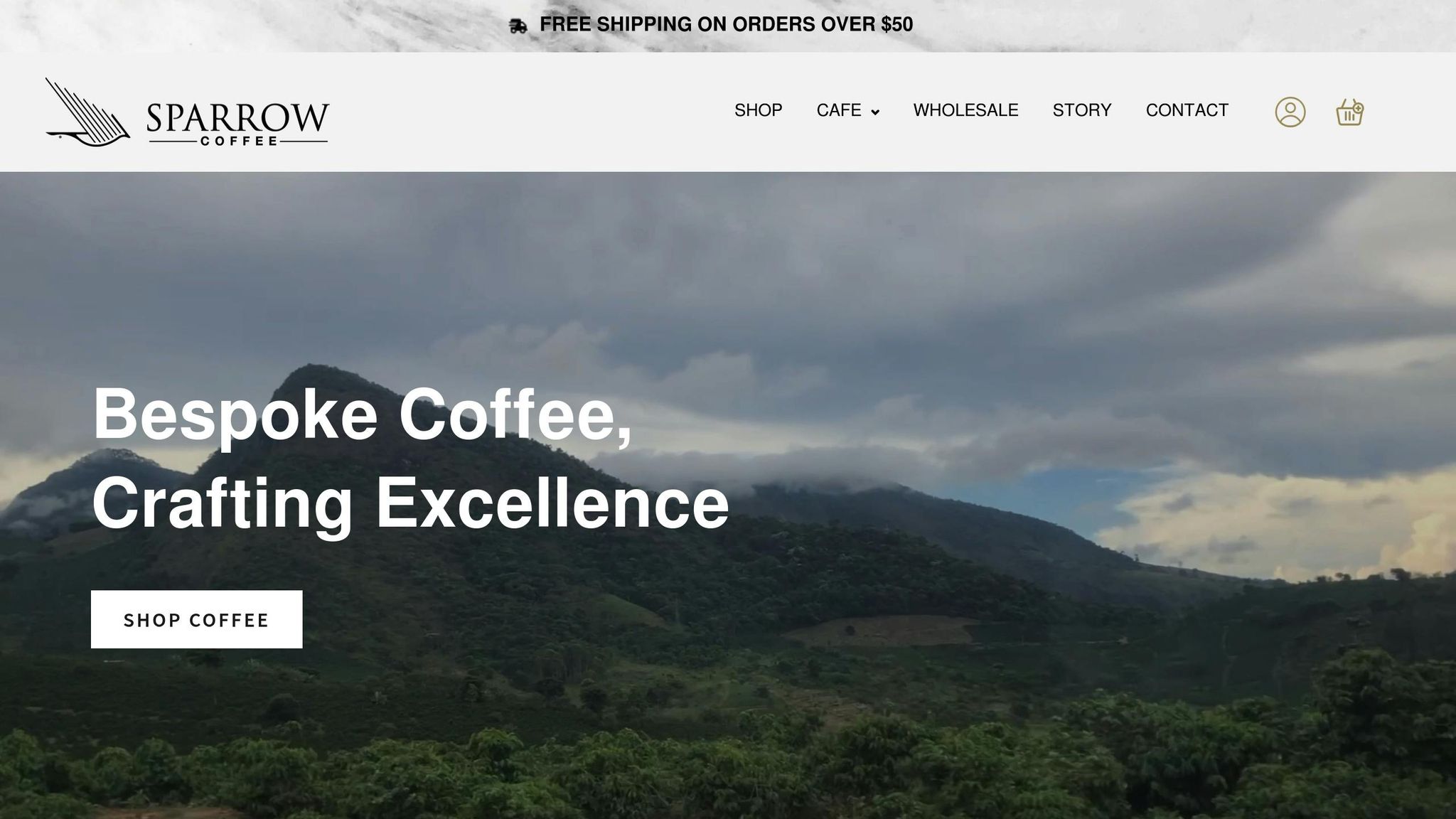
Sparrow Coffee operates with a simple yet powerful philosophy: "elevate the craft and do no harm." They primarily source certified organic and "organic-by-default" coffees from small shareholder farms, focusing on nano-lots and micro-lots. This approach not only highlights unique flavor profiles but also supports small-scale producers [1][3].
What makes Sparrow unique is their use of modified roasting technology. Unlike traditional roasters that rely on afterburners - devices that consume five times more natural gas and emit significantly more greenhouse gases - Sparrow employs a hybrid-green system that drastically reduces emissions. As they put it, "Coffee roasting should be a responsible endeavor, avoiding afterburners that drastically increase emissions" [3].
In addition to their environmental efforts, Sparrow connects with the community through educational classes and cupping sessions, helping coffee enthusiasts deepen their appreciation for the craft [2].
Groundswell Coffee Roasters

Groundswell Coffee Roasters stands out for their precision and transparency. They carefully source beans from farms and cooperatives that emphasize environmental stewardship, fair labor practices, and sustainable farming. This ensures that every bag of coffee reflects ethical practices from farm to cup [4].
A prime example of their dedication is the "Nugkui, Peru roast", a light roast featured at their Madison and Damen locations in September 2024. This blend celebrates the work of female coffee growers in Peru.
Nugkui honors the value of female growers, highlighting both their commitment and sustainable practices [6].
Groundswell's commitment to sustainability extends beyond coffee. Their café spaces incorporate eco-friendly elements like custom tables and benches made from recycled barn wood [5].
Modest Coffee
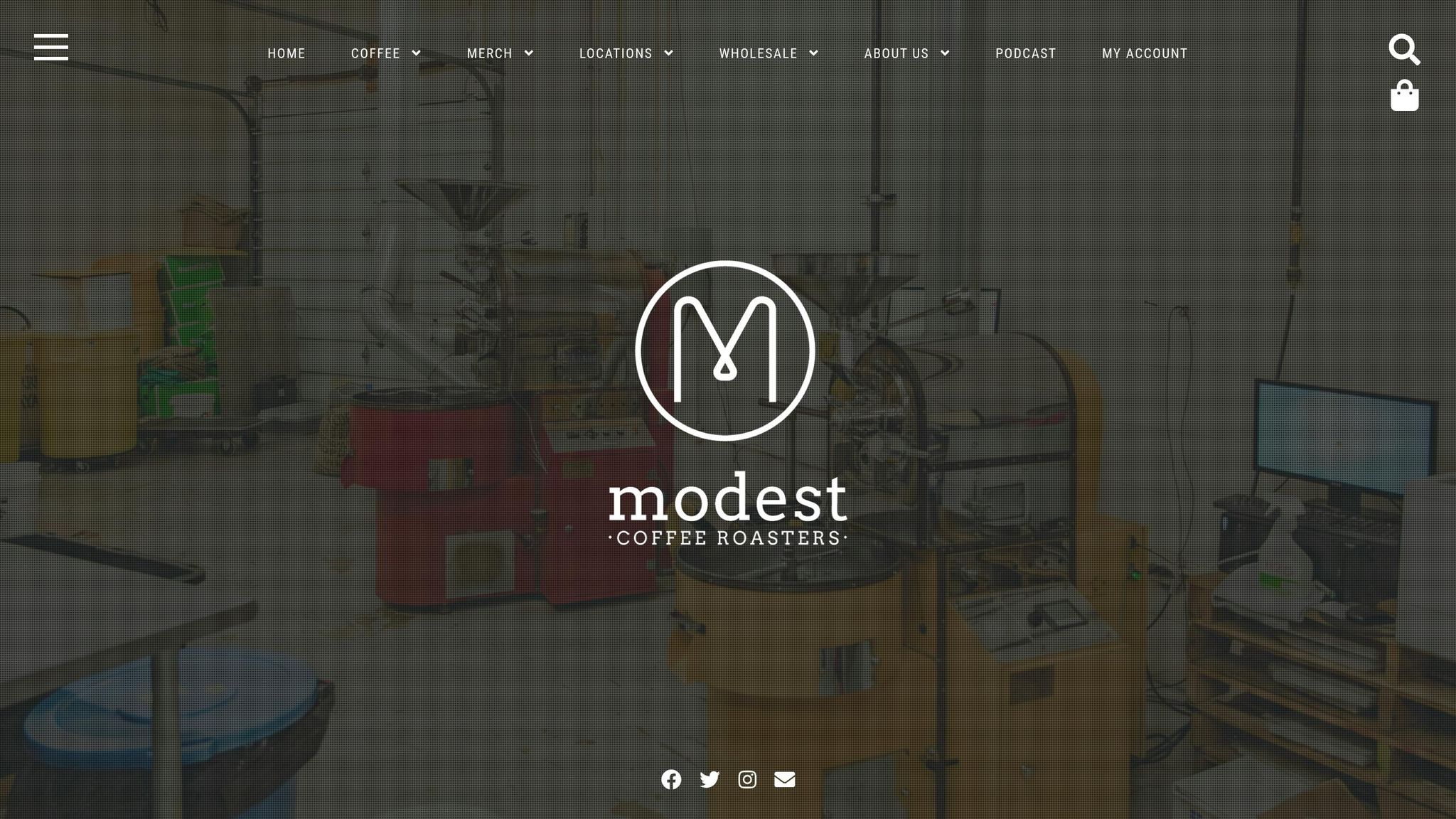
Modest Coffee is a leader in ethical practices, earning Platinum Status with the Green Business Bureau for their extensive environmental initiatives. They are also working toward Fair Trade certification while maintaining direct trade relationships with certified B-Corps [7].
The roastery supports small farmers by purchasing whole crops, reducing waste with home-compostable bags and reusable packaging, and providing coffee chaff and spent grounds to the community for composting [7][8]. They also prioritize green logistics by using an electric delivery vehicle and offering an EV charger at their facility [7].
Modest Coffee's commitment to their employees is equally impressive. They uphold a Living Wage Pledge, ensuring a minimum pay of $15 per hour while fostering a positive, community-focused work environment [7].
These three roasters exemplify how Chicago's coffee scene can combine exceptional quality with a deep commitment to sustainability and ethical practices, proving that great coffee can also make a positive impact.
sbb-itb-1371159
How These Roasters Compare
Chicago's ethical coffee roasters each take their own path toward responsible coffee production. While their methods vary in sourcing transparency and environmental practices, information on community outreach remains limited. Here's a quick breakdown of how they stack up.
Sourcing Transparency
- Modest Coffee: This roaster prioritizes direct sourcing, often buying entire crops from small farmers. This ensures traceability back to specific families, regions, and farms [8][9].
- DOMA Coffee Roasting Company: Transparency is a key focus here, with direct purchases from farmers and membership in a Fair Trade cooperative of 23 roasters [11].
- Sparrow Coffee: Sourcing efforts include certified organic and "organic-by-default" coffees from small shareholder farms [1].
- Groundswell Coffee Roasters: Details about their sourcing practices were unavailable.
Environmental Initiatives
- DOMA Coffee Roasting Company: Demonstrates a strong commitment by using a roaster that cuts gas consumption by 80% [10].
- Sparrow Coffee, Modest Coffee, and Groundswell Coffee Roasters: No specific environmental practices were noted in the available research.
Community Support
- DOMA Coffee Roasting Company: Actively supports various community and environmental organizations, though specific partnerships were not detailed.
- Other Roasters: No clear information on community engagement was provided.
Side-by-Side Comparison
| Roaster | Sourcing Approach | Environmental Focus | Community Impact |
|---|---|---|---|
| Sparrow Coffee | Certified organic coffees, small shareholder farms [1] | Not specified | Not specified |
| Groundswell Coffee Roasters | No specific information available | Not specified | Not specified |
| Modest Coffee | Direct sourcing; entire crop purchases with traceability [8][9] | Not specified | Not specified |
| DOMA Coffee Roasting Company | Direct farmer purchases; Fair Trade cooperative member [11] | 80% gas consumption reduction [10] | Supports community and environmental organizations |
*Community impact details are limited for some roasters.
Each of these roasters brings something different to the table. If sourcing transparency is your priority, Modest Coffee and DOMA Coffee Roasting Company stand out. For those focused on environmental impact, DOMA's energy-efficient roasting technology is noteworthy. Since community engagement details are sparse, curious buyers may want to dig deeper to fully understand each roaster’s commitment to sustainability and community involvement.
Find More Ethical Coffee in Chicago
Chicago has no shortage of coffee spots that align with ethical sourcing standards. Whether you're a local or just visiting, discovering these places has never been easier.
Start by checking out BestCafeChicago.org. This site lets you search for cafés by neighborhood and specialty, with detailed listings that highlight terms like "ethically sourced", "direct trade," or "sustainable practices." Some standout roasters featured include La Colombe Coffee Roasters, Intelligentsia Coffee, Groundswell Coffee Roasters, and Dark Matter Coffee, all of which emphasize ethical sourcing in their descriptions.
Want to dig deeper? Don’t hesitate to ask your barista about where their beans come from. Many cafés proudly share details about their farmer relationships, certifications, and sustainability initiatives. Keep an eye out for certifications like Fair Trade, Rainforest Alliance, or USDA Organic - these are often displayed prominently in ethical coffee shops.
To stay in the loop, sign up for the Coffee Lovers' Newsletter on BestCafeChicago.org. The site's Café Chronicles Blog is another great resource for exploring Chicago's coffee scene and learning more about its commitment to ethical practices.
Finally, take the time to explore local roasters. Many of them have direct relationships with farmers and are deeply connected to their communities, making your coffee experience even more meaningful.
Conclusion
Opting for ethical coffee roasters has a ripple effect - uplifting communities, protecting natural resources, and strengthening local economies. By choosing roasters like Sparrow Coffee, Groundswell Coffee Roasters, Modest Coffee, or DOMA Coffee Roasting Company, you’re backing businesses that emphasize fair wages, environmentally conscious practices, and community development.
What’s more, ethical sourcing doesn’t sacrifice quality - it enhances it. Direct trade partnerships enable roasters to collaborate closely with farmers, refining growing techniques and processing methods. The result? Coffee that not only tastes exceptional but also reflects a commitment to fairness and sustainability. Premium prices for ethically sourced beans lead to better incomes for farmers and eco-friendly farming practices that safeguard the planet. In Chicago, these values shine brightly through the work of local roasters.
Chicago’s coffee scene is brimming with ethically minded options. Local roasters stand out by embracing sustainable methods like carbon-neutral shipping and compostable packaging, while also supporting nonprofits, ensuring fair wages, and fostering welcoming community spaces.
So, the next time you’re in the mood for a cup of coffee, consider one of these ethical roasters. Every purchase fuels a movement rooted in quality, sustainability, and community-focused values - principles that continue to shape Chicago’s thriving ethical coffee culture.
FAQs
Why should I choose coffee from ethical roasters in Chicago?
Choosing coffee from ethical roasters in Chicago does more than just satisfy your caffeine cravings - it supports farming practices that are better for the planet and ensures farmers are paid fairly for their work. This approach helps safeguard natural resources while promoting economic stability in regions where coffee is grown.
What sets ethical roasters apart is their commitment to transparency and traceability. You know exactly where your coffee comes from and can trust its quality. Plus, by supporting these roasters, you're not just buying coffee - you’re helping build a stronger community and making choices that reflect care for both people and the environment.
How do coffee roasters in Chicago support fair pay for farmers?
Ethical coffee roasters in Chicago are making a real difference by prioritizing fair pay for farmers through fair trade practices and direct trade partnerships. Fair trade guarantees farmers a minimum price for their coffee, along with additional premiums that help support better living conditions and long-term stability. On the other hand, direct trade allows roasters to collaborate more closely with farmers, often paying higher-than-market rates to reward exceptional quality and environmentally responsible farming.
Local roasters like Metropolis Coffee and Metric Coffee are leading the charge in these efforts. They go beyond just fair wages by emphasizing transparency, openly sharing their payment practices to uphold accountability. These initiatives not only create a fairer coffee supply chain but also promote farming methods that are better for the planet.
What sustainable practices do ethical coffee roasters in Chicago follow?
Ethical coffee roasters in Chicago are making strides toward sustainability by prioritizing practices that benefit both people and the planet. They source their beans from farms that uphold fair labor practices and focus on responsible land management. Many also invest in energy-efficient roasting equipment to cut down on carbon emissions, while supporting farming methods that restore soil health.
These roasters are equally dedicated to maintaining transparent supply chains, ensuring that every step, from the farm to your morning cup, aligns with their principles of fairness and responsibility. Through these efforts, they’re not only uplifting the local community but also making a positive impact on the global coffee industry.
